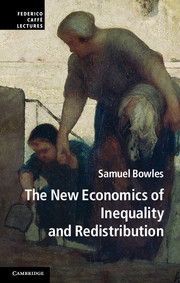Book contents
- Frontmatter
- Contents
- Illustrations
- Preface
- 1 The new economics of inequality and redistribution
- 2 The economic cost of wealth inequality
- 3 Feasible egalitarianism in a competitive world
- 4 Globalization, cultural standardization, and the politics of social insurance
- 5 Reciprocity, altruism, and the politics of redistribution
- 6 Conclusion
- Appendices
- Works cited
- Index
6 - Conclusion
The new (not so dismal) science of inequality and redistribution
Published online by Cambridge University Press: 05 February 2013
- Frontmatter
- Contents
- Illustrations
- Preface
- 1 The new economics of inequality and redistribution
- 2 The economic cost of wealth inequality
- 3 Feasible egalitarianism in a competitive world
- 4 Globalization, cultural standardization, and the politics of social insurance
- 5 Reciprocity, altruism, and the politics of redistribution
- 6 Conclusion
- Appendices
- Works cited
- Index
Summary
Good news often falls on deaf ears. In this case, my own. In 2002 I joined a campaign of trade unionists and community activists in Santa Fe, New Mexico, seeking an increase in the minimum wage, which, for the state of New Mexico, then stood at $4.15 an hour, well below the US federal minimum wage. When asked about the discrepancy, a Santa Fe businessman explained that it “sent a good signal to investors.” Less than an hour into my first meeting with members of the so-called living-wage campaign, I found out that I, too, had become an equality pessimist.
The group was seeking an increase to $8.50 an hour. I balked, worried about the hotel room cleaners and restaurant food-choppers in this tourist town who might find themselves out of work. And I doubted whether the well-heeled, politically elite of the city would go for it. Couldn’t we propose an increase to $5.50 and then, if we won, go on from there? A former organizer from the Communications Workers of America vociferously objected: “I’m not going to go out there and demand a wage that would place the worker below the poverty line even if she worked full time all year. I’m not going to sign on to that kind of injustice.”
- Type
- Chapter
- Information
- The New Economics of Inequality and Redistribution , pp. 159 - 163Publisher: Cambridge University PressPrint publication year: 2012



